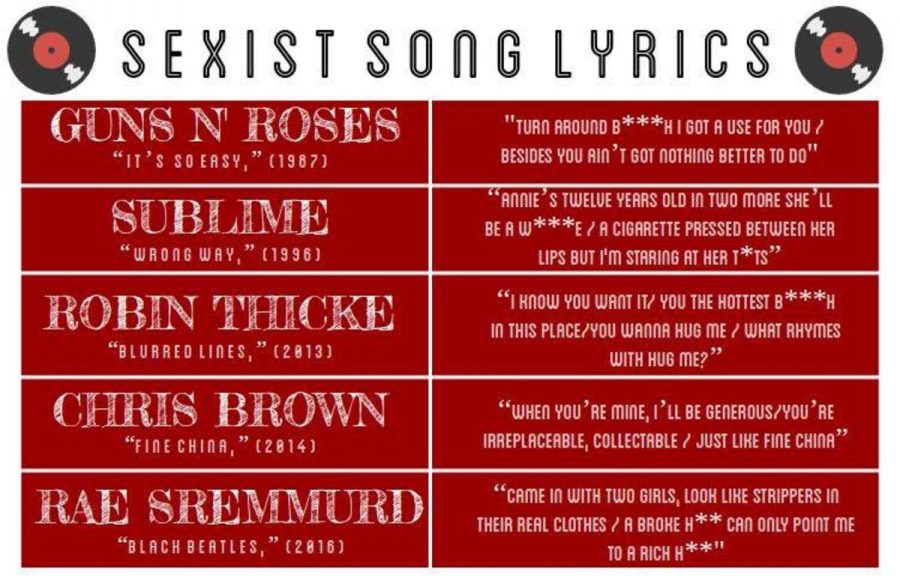Be aware of what you’re listening to
December 7, 2016
“Came in with two girls, look like strippers in their real clothes / A broke h– can only point me to a rich h–.”
These lyrics come from Rae Sremmurd’s “Black Beatles,” the number one song on the Billboard Top 100 for the week of Dec. 3 that gained its popularity from the social media craze known as the “Mannequin Challenge.” Hundreds of students have probably belted out this chorus driving out of school on a Friday. But what many haven’t noticed is that although this song seems fun and innocent, it contains degrading lyrics about women; words that many view as inappropriate in everyday life, but when sung in lyrics are considered socially acceptable.
A disturbingly large amount of popular songs contain lyrics that are offensive to women in many ways, from objectifying women to using profanity when referring to them.
While artists and record labels have the right to express whatever they want in their music, the fact that we have become so accustomed to these profane lyrics is an extremely disturbing reflection on how the public views women. If a song contains lyrics that are blatantly sexist, the country should at least be aware of the message that the song is sending.
Over time, America has served as an example for the rest of the world on how to give women equal rights, freedom, and opportunities. However, while women’s legal rights have expanded, some of our pop culture ignores those strides, especially when considering popular music.
In 1965, only 7.2 percent of women held a college degree, and the most popular song was Sam the Sham and the Pharaohs’ “Wooly Bully,” a truly innocent song, with no real story line and certainly no demeaning references to women. By 2015, 32.7 percent of women had college degrees and the most popular song was Bruno Mars and Mark Ronson’s “Uptown Funk,”, a song that features lyrics like “B***h say my name you know who I am.”
The word “b***h” is something that would never be heard in music or television back in the ‘60s, when women were far more widely mistreated in the professional world. Terms like this have become ubiquitous in popular music, on television and in casual conversation seemingly making it seem more socially acceptable to disrespect women by using these derogatory terms.
Far more work needs to be done to create full equality; the fact that disrespecting women in pop culture has become more acceptable while disrespecting women in the workplace has become less acceptable is outrageous. Moreover, widespread purchase of such songs only furthers the idea that this kind of treatment of women is tolerable.
Expecting the world to stop listening to every previously released song that contains sexist lyrics isn’t realistic. However, people can stop paying to listen to songs that clearly discriminate against women; hopefully helping record companies, as well as listeners realize that these lyrics are not something that the country finds socially acceptable, generating more awareness.
So, before people spend that $1.29 on the newest top 50 hit, everyone should take a minute to think about the message that song is really sending.










Lola Bethell • Jun 28, 2021 at 4:41 am
Uptown Funk is a great song, but I never stopped to actually listen to the lyrics. I don’t believe that the lyrics are completely sexist, however they do heavily objectify and disrespect women. The music video is filmed completely from a male perspective, and we cant even see the faces of the girls walking by; the frame is cut off and only displays sexualised body parts.
Jaylen Wheeler • Jan 18, 2017 at 10:45 am
I don’t agree with you putting Chris Brown’s song, Fine China as “sexist” because he’s talking about one woman that he loves and will not replace like fine china. Fine china may be ancient but it’s still collectable and not replaceable.
Barack Hussein Obama • Dec 14, 2016 at 11:25 am
lol you want full equality, then you should have to sign up for the draft. Also these men who do these songs arnt sexist. They are supposed to entertain people and as far as i know, many millions of women enjoy these songs and dont think about the words in these songs and how they are oppresive or discrimatory. I cant help but feel sorry for you, your trying to become a victim so hard, guess what… Its not working.
Alum2014 • Dec 8, 2016 at 12:31 pm
The author is right – there is a problem in the music industry that must be fixed. While we’re at it, we should address gang violence, drug abuse, violence in general, gambling, premarital sex, extramarital sex, and profanity by refusing to listen to music containing any of those themes. Only listening to Michael Buble and Will Smith is perfectly fine as long as everyone feels safe when they open up iTunes…
Anonymous • Dec 7, 2016 at 11:20 pm
I appreciate the perspective the author provides and thank her for a thought-provoking read that raises important questions for music lovers and listeners. However, I wonder how the songs by female artists who use similar language play into this issue — are they just as problematic and sexist? for the same or different reasons? In addition, I feel it is important to recognize the sexism present in other forms of media in the 1960s, such as the many misogynistic advertisements that would never be considered acceptable today. Regardless, an excellent piece and an important issue to remain cognizant of.